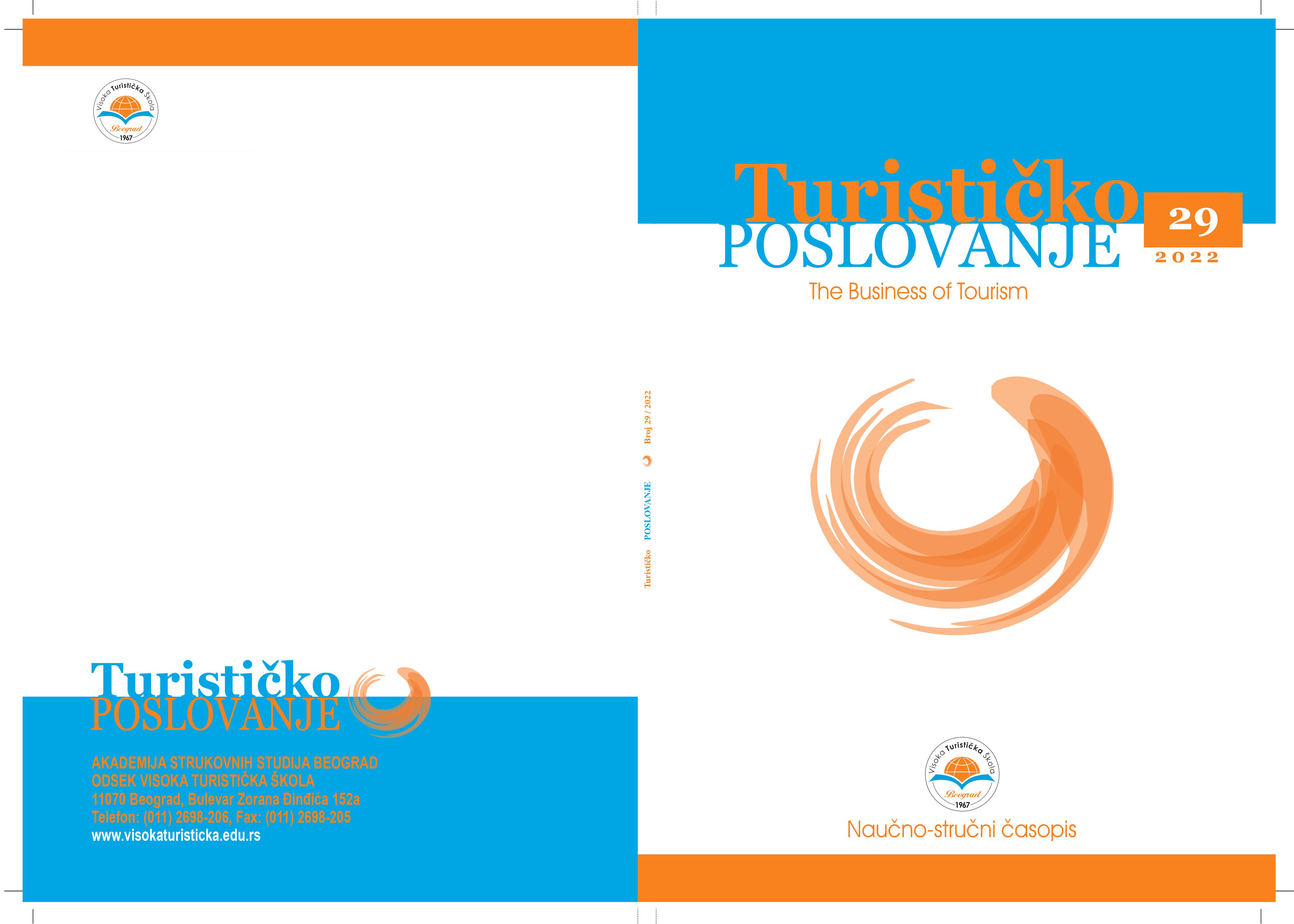Concept of place in literary tourism
Abstract
The aim of this paper is to depict how the concept of place is presented and interpreted in literatury tourism. Drawing upon the poststructuralist and postmodern theories of culture and tourism the paper will explore the relation between the literary places and tourists. In other words, the paper examines how the literary places influence visitors’ experiences of certain places and how the visitors assign meanings to the fictional places which exist in the real world and vice-versa (the real places which also exist in the world of fiction). In the context of literary tourism the boundaries between the fictional and non-fictional worlds are inevitably blurred in the tourist’s experience. The tourist becomes the active creator of both, the potential tourist offer and the authentic experience which is personal and subjective. In order to create the appropriate tourist offer to the bibliophiles it is of the utmost importance to understand the way visitors experience such places. In order for the literary place to become popular it is necessary to include several factors including the creative act of the visitor.
References
Bart, R. (1999) Smrt autora. U: Beker M. Suvremene književne teorije. Zagreb: Matica hrvatska, str. 196-201.
Baudrillard, J. (1994) Simulacra and Simulation. Ann Arbor: University of Michigan Press
Budgen, F. (1972) James Joyce and the Making of ‘Ulysses’ and other writings. London: Oxford University Press.
Darici K. (2015) To draw a map is to tell a story. Interview with Dr. Robert T. Tally Jr. on Geocriticism. Forma. Revista d’Estudis Comparatius, Art, literatura, pensament. Universitat Popmeu Fabra,11,27-36 [online] https://raco.cat/index.php/Forma/article/view/294989 [pristupljeno 03.02.2022].
Fisk, Dž. (2001) Popularna kultura. Beograd: Clio.
Fuko, M. (2005) Druga mesta. U: Milenković P. i Marinković D. Mišel Fuko: 1926–1984–2004 . Novi Sad: VSA, str. 29-36.
Herbert, D. T. (2001) Literary Places, Tourism and Heritage Experience. Annals of Tourism Research, 28 (2), 313-333.
Hoppen, A., Brown, L. and Fyall, A. (2014) Literary Tourism: Opportunities and Challenges for the Marketing and Branding of Destinations. Journal of Destination Marketing & Management, 3(1), 37-47.[online] dostupno na: http://dx.doi.org/10.1016/j.jdmm.2013.12.009 [pristupljeno 03.02.2022.].
Jiang, L., and Yu, L. (2019) Consumption of a literary tourism place: a perspective of embodiment. Tourism Geographies, 22, 127 - 150. Dostupono na: https://www.tandfonline.com/doi/abs/10.1080/14616688.2019.1586985?journalCode=rtxg20 [pristupljeno 03.02.2022.].
Lefebvre, H. (1991) The Production of Space. Oxford: Basil Blackwell Ltd.
Lipovšek, E and Kesić, S (2014) Journeys beyond pages: The use of fiction in tourism. Turističko poslovanje, 14, 51-60.
Lovereading. [online]. Dostupno na https://www.lovereading.co.uk/bookmap/# [pristupljeno 15.02.2022.].
Morris, C. (2017) Secular relics: Narrative objects and material biography in the museums of Darwin, Elgar & Holmes (unpublished PhD Thesis), University of the West of England.
Pocock, D.C.D. (1987) Haworth: the experience of literary place. In: Mallory, W.E. and Simpson-Housley P. (eds). Geography and Literature. New York: Syracuse University Press, pp. 134-142.
Quinteiro, S and Baleiro, R. (2018) Key concepts in literature and tourism studies. Lisboa: Centro de Estudos Comparatistas.
Schaff, B. (2011). “In the Footsteps of ...”: The Semiotics of Literary Tourism. KulturPoetik, 11(2), 166–180 [online]. Dostupono na: http://www.jstor.org/stable/41305930 [pristupljeno 27.01.2022.].
Seaman, A. N. (2016) Exploring the Connections Between Literary Places, Literary Texts, and Tourist Performance (PhD Thesis), Clemson University.
Seaman, A.N. (2019) Making literary places. In Jenkins, I and Lund, L.A. Literary tourism: theories, practices and case studies. Wallingford, Oxfordshire, UK ; Boston, MA : CABI, 140-148.
Smith, M. (2009) Issues in cultural tourism studies. London: Routledge.
Smith, Y. (2012) Literary Tourism as a Developing Genre: South Africa’s Potential, (Magister Paper), University of Pretoria.
Soja, E. W. (1996) Thirdspace: Journeys to Los Angeles and other real-and-imagined places. Cambridge, Mass: Blackwell.
Squire, S.J. (1988) Wordsworth and Lake District Tourism: Romantic Reshaping of Landscape. Canadian Geographer / Le Géographe canadien, 32, 237-247 [online]. Available at: https://doi.org/10.1111/j.1541-0064.1988.tb00876.x [03.01.2022.].
Squire, S.J. (1996) Landscapes, places and geographic spaces: Texts of Beatrix Potter as cultural communication. GeoJournal 38, 75–86 [online]. Dostupno na: https://doi.org/10.1007/BF00209121 [pristupljeno 03.01.2022.].
Tally, R.T. (2011) Translator’s Preface: The Timely Emergence of Geocriticism. In: Westphal, B. Geocriticism: Real and Fictional Spaces. Basingstoke: Palgrave Macmillan, ix-xiii.
Tally, R.T. (2013) Spatiality. New York: Routledge.
The world of Beatrix Potter. [online]. Dostupno na: https://www.hop-skip-jump.com/attraction/ [pristupljeno 10.02.2022.].
Tuan, Y. F. (2001) Space and Place: The Perspective of Experience. Minneapolis, MN: University of Minnesota Press.
Urry, J. (1995) Consuming places. London: Routledge.
Urry, J. (2002) Mobility and Proximity. Sociology 36, (2), 255-274.
Watson, N.J. (2006) The Literary Tourist: Readers and Places in Romantic and Victorian Britain. Basingstoke: Palgrave Macmillan.
Westover, P.A. (2012) Inventing the London of literary tourists: Walking the romantic city in Leigh Hunt’s “Wishing Cap” essays. European Romantic Review, 23(1), 1-19.
Westphal, B. (2011) Geocriticism: Real and Fictional Spaces. Basingstoke: Palgrave Macmillan.
Woolf, V. (1986) Literary geography. In: McNeillie A. The Essays of Virginia Woolf. San Diego: Harcourt Brace Jovanovich, pp. 28–42.

